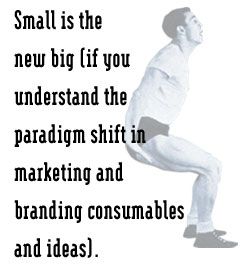May 2, 2004
Having a Major Minor Success
In today’s Washington Post it was revealed that Micah Ian Wright, who last summer published the wickedly creative book of repurposed war posters called You Back the Attack! We’ll Bomb Who We Want! lied about his own war record.
Former Army Ranger turned antiwar comic book artist Wright had what he calls a moment of clarity after participating in the U.S.’s 1989 invasion of Panama.
Publisher’s Weekly
Wright lied about his war record. He never served in the Rangers or the military and is now apologetic that his minor lie became a major mistake. That, by itself, is hard enough to swallow. It’s difficult to see someone who speaks with such clarity be caught in such deceit. So unnecessary. Yet, what really caught my eye in the Post article was this gem:
Wright’s book of satirically “remixed” World War II propaganda posters was a minor success, selling more than 20,000 copies [emphasis mine].
A minor success. That’s an interesting oxymoron.
In parts of the art world, most notably within the art market, one often hears the phrase “He’s a minor artist.” Minor being a word to connote less important in the future history of art and, therefore, less collectable.
It’s all so diminishing.

I might be referred to as a minor blogger. Actually, not too many refer to me at all. My hits and list of comments are miniscule next to those on the A-List. But in this new world order, high numbers aren’t required to make you a success. I’ve created a niche market. I have my loyal readers. And exhaustive market research has shown they are highly intelligent, interested in quirky storytelling, and just might be related to me.
“Minor” is old world. “Niche” is new. Small is the new big (if you understand the paradigm shift in marketing and branding consumables and ideas). Economies of scale and means of production are allowing anyone to publish, sell, and bypass the traditional marketing gatekeepers. Authors and musicians are selling or giving away their work online. Viral marketing.
Minor League baseball is now a major attraction. Ballparks are professional grade, easily accessible (not the major traffic jams now associated with getting into and out of the big leagues), cheap, and filled with loyal fans. The experience reminds us 21st century citizens of baseball’s 19th century origins.
In his latest book Free Prize Inside, Seth Godin tells us companies can no longer afford difficult and risky technological innovation; the return will not likely be great enough to justify the huge capital outlay. Conversely, spending millions for ad campaigns to tell us we need this new product will also fail. Advertisements just don’t work anymore, at least in the way they used to. Consumers have been inundated with far too many to have the impact and justify the cost.
“The half-life of a successful product is shorter than ever, so ideas need to be cheaper to build and faster to market.” Godin champions “the remarkable” over the traditional marketable: small ideas (he calls them “soft innovation”) that any of us can do that will make our “products” more usable (and possibly cut costs). We can all be stakeholders in this new world.
As an example Godin talks about his recent hernia operation. As he describes it: “it costs a lot, it hurts and the hospital makes a fortune.” Where it hurts may surprise you. While you’re asleep they clamp your mouth open and you wake up with a major sore throat. Because they use a catheter, it also hurts to pee. The doctors could care less whether it hurts. But the hospital should. If you’re experience there is a good one you’ll come back. If not, there are other hospitals.
His surgeon told him if he had sucked on a throat lozenge and had some cranberry juice when he had gotten home he would have felt a lot better. So the question Godin asked himself was why didn’t anyone at the hospital offer him these things? Rather than the apple juice and graham cracker the hospital dietician had decided was best for patients, what if an enterprising nurse had suggested something to suck on and the better juice? And what if the hospital listened?
Patients’ experiences would be much more pleasant and the next time they needed to go to the hospital they would come back. A simple idea that could yield profitable results.
Success will pivot on our understanding of these new ways of working. In fact, marketing isn’t just about selling a product anymore. It’s about creating good user experiences whether we’re buying something or navigating through a Web site. And I don’t need an ad agency or a large R & D budget to carry it off.
Minor success. I’ll buy that.
View Most Recent Story![]() :::
:::![]() Notify me when there's a new missive!
Notify me when there's a new missive!


 ShareThis
ShareThis